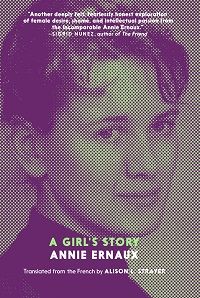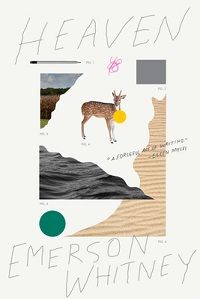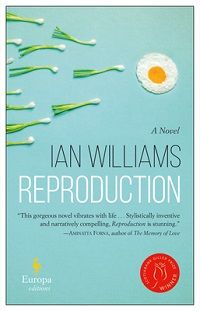This month I have four brand new small press books and one book published last year. These titles include memoirs and novels by authors from Canada, Argentina, and the U.S., with two books in translation. You’ll find family sagas, meditative accounts of personal experience, explorations of gender and sexuality, and a dive into the dark places of the human mind. I hope you find a book here you love!
A Girl’s Story by Annie Ernaux, Translated by Alison Strayer (Seven Stories Press)
A Girl’s Story is an account of 18-year-old Annie Ernaux in 1958 when she leaves home for the first time to work as a camp counselor. Coming from a poor family, she feels like an outsider, but she is determined to experience new things and life fully. Most of all, she is determined to fall in love. What actually happens are complicated sexual encounters that leave her enamored but also the laughing stock of her peers. Ernaux examines not only what happened in the couple years after these events but also how she feels about the experience from the vantage point of 50 years later. The book is a beautiful contemplation of desire, memory, time, and the self. It’s also the story of how Ernaux emerged from this difficult period as a young woman ready to become a writer.
Heaven by Emerson Whitney (McSweeney’s Publishing)
This is a perfect book for fans of Maggie Nelson’s The Argonauts (in fact, Maggie Nelson blurbed this book). It’s also great for anyone who loves genre-bending nonfiction, books that challenge gender norms, and books that narrate the body in frank and open ways. Emerson Whitney writes about childhood struggles with poverty, complex family relationships, and coming to terms with being gender-nonconforming. Whitney’s portrayal of their relationship with their mother and grandmother are particularly nuanced and memorable. Mixed in with this personal material are philosophical discussions of gender, self, and identity, drawing on writers such as Judith Butler and Donna Haraway. Whitney weaves these various strands into a powerful, ground-breaking account of growing up and figuring out one’s relationship to oneself and the world.
For Joshua: An Ojibwe Father Teaches His Son by Richard Wagamese (Milkweed Editions)
This book is a memoir written in the form of letters to Richard Wagamese’s estranged son Joshua. It’s meant to help Joshua understand the complicated life that Wagamese has led and also to fulfill Wagamese’s duty as an Ojibwe father to teach his son traditional wisdom. He describes early memories of being removed from his family and living in foster care and with an adoptive family. These moves shake his sense of security and cultural identity. As he gets older, he runs away from home and lives an itinerant life, sometimes getting by on the streets, sometimes in jail. He drinks heavily. Eventually he meets people who begin to teach him Native wisdom, and he struggles to change his life. Moving back and forth between the past and present, between struggle and insight, he weaves narrative and teaching into a powerful, inspiring whole.
Reproduction by Ian Williams (Europa Editions)
Reproduction won the 2019 Giller Prize, a Canadian award for fiction. This novel is a family saga set in Toronto, covering multiple generations of complicated, troubled people. At the novel’s heart is Felicia, a 17-year-old student from an unnamed Caribbean island. She meets Edgar, who comes from a wealthy German family, while the two of them visit their mothers in the hospital. Felicia ends up becoming a caretaker for Edgar’s mother, and she and Edgar develop a relationship. Later we meet their son Army, who is obsessed with making money. Other characters enter the story as the decades go on, the younger generation grappling with the actions and secrets of the older one. Williams brings the characters’ struggles and flaws to life with compassion and intelligence, and the novel deftly explores themes of inheritance, race, money, sex, and love.
Die, My Love by Ariana Harwicz, Translated by Sarah Moses and Carolina Orloff (Charco Press)
Die, My Love was longlisted for the 2018 Man Booker International Prize and was released in the U.S. last year. It was recently longlisted for the 2020 Best Translated Book Award as well. It’s narrated (with occasional point of view shifts) by a woman struggling with depression (possibly postpartum) and perhaps other mental illness. She lives with her husband and baby son in the French countryside. We don’t learn much about her except that she’s an immigrant. She feels isolated from her husband and struggles to care for her son. She lashes out, sometimes violently, and seeks an outlet in an affair with a neighbor. We get deep into her mind, seeing the world from her troubled perspective. She’s an unsparing narrator, telling her every anguished thought and action. Harwicz’s writing is astonishing. Through her unforgettable narrator she paints the world in vivid and frightening color. Looking for even more great independent press books? Check out my round-ups from February and March.




